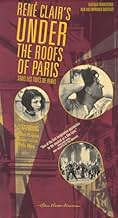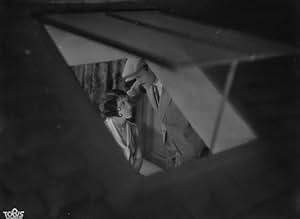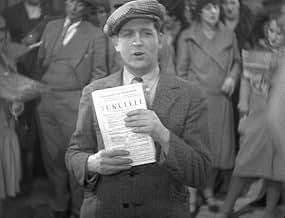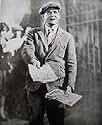CALIFICACIÓN DE IMDb
7.0/10
2.6 k
TU CALIFICACIÓN
Agrega una trama en tu idiomaAlbert is smitten for Pola but ends up wrongly committed in jail, in the meantime her affections are sought after by his friend, and on his release both love and friendship must be tested.Albert is smitten for Pola but ends up wrongly committed in jail, in the meantime her affections are sought after by his friend, and on his release both love and friendship must be tested.Albert is smitten for Pola but ends up wrongly committed in jail, in the meantime her affections are sought after by his friend, and on his release both love and friendship must be tested.
- Dirección
- Guionista
- Elenco
- Premios
- 1 premio ganado en total
Edmond T. Gréville
- Louis
- (as Edmond Gréville)
Delphine Abdala
- La buraliste
- (sin créditos)
Raymond Aimos
- Un gars du milieu
- (sin créditos)
Raymond Blot
- Un membre de la bande à Fred
- (sin créditos)
Thomy Bourdelle
- François
- (sin créditos)
Léon Courtois
- L'inspecteur
- (sin créditos)
Édouard Francomme
- Un membre de la bande à Fred
- (sin créditos)
André Michaud
- Un agent
- (sin créditos)
Jane Pierson
- La dame du premier
- (sin créditos)
Louis Pré Fils
- Le locataire du troisième
- (sin créditos)
Eugène Stuber
- Un membre de la bande à Fred
- (sin créditos)
Louis Zellas
- Le consommateur jaloux
- (sin créditos)
- Dirección
- Guionista
- Todo el elenco y el equipo
- Producción, taquilla y más en IMDbPro
Opiniones destacadas
While singing in a lower class quarter in Paris, the street singer Albert (Albert Préjean) falls in love with the Romanian party girl Pola (Pola Illéry), who is the companion of the gangster Fred (Gaston Modot). One night, Albert meets with Pola, who has just found that Fred had stolen her key, and his friend Louis (Edmond T. Gréville) proposes to toss to date her. However, Albert brings her to his room and they spend the night together, with Albert sleeping on the floor and Pola on his bed. Early in the morning, the pickpocket Émile (Bill Bocket) brings a bag with stolen pieces and asks Albert to keep the bag for him. When the police busts Albert's room and finds the stolen goods, he is arrested and sent to jail. Meanwhile Fred travels and Pola seeks comfort with Louis, and they stay together. When Émile is arrested by the police, he confesses that Albert is innocent and he is released and seeks out Pola. Meanwhile Fred returns to Paris and also seeks out Pola that is with Louis. The three men that are under the spell of the gorgeous lady dispute her love and only one wins.
"Sous les Toits de Paris" is a film with a wonderful transition between silent and sound eras. This is the first René Clair's film that I watched and I found very original and interesting the style of this director that uses the acting of silent movies with gestures and facial expressions and dialogs instead of intertitles, everything supported by the marvelous song "Sous les Toits de Paris" and impressive camera work. The paradox of this delightful film are the low-life characters, composed by pickpocket (Émile); gangster (Fred); a pickpocket that steals the girl of his friend (Louis); and an easy woman (Pola). It is also unusual that the girl does not end the story with the good guy, showing no commercial concern like in most of the Hollywood movies. Not only Albert, Fred and Louis, but I have also been bewitched by the beauty and charm of Pola Illéry. I did not find any information about the death of this actress in Internet. My vote is eight.
Title (Brazil): "Sob os Tetos de Paris" ("Under the Ceilings of Paris")
"Sous les Toits de Paris" is a film with a wonderful transition between silent and sound eras. This is the first René Clair's film that I watched and I found very original and interesting the style of this director that uses the acting of silent movies with gestures and facial expressions and dialogs instead of intertitles, everything supported by the marvelous song "Sous les Toits de Paris" and impressive camera work. The paradox of this delightful film are the low-life characters, composed by pickpocket (Émile); gangster (Fred); a pickpocket that steals the girl of his friend (Louis); and an easy woman (Pola). It is also unusual that the girl does not end the story with the good guy, showing no commercial concern like in most of the Hollywood movies. Not only Albert, Fred and Louis, but I have also been bewitched by the beauty and charm of Pola Illéry. I did not find any information about the death of this actress in Internet. My vote is eight.
Title (Brazil): "Sob os Tetos de Paris" ("Under the Ceilings of Paris")
10zetes
René Clair's early sound films are amongst the best ever made. Le Million (1931), Quatorze Juillet (1933), and Under the Roofs of Paris (1930) are masterpieces of musical comedy and romance (I leave out perhaps his most famous, À nous la liberté, which I need to see again). Under the Roofs of Paris is the loose but good story of a young street singer (Albert Préjean) who falls in love with a girl (Pola Illéry). He has an uneasy relationship with a couple of pickpockets (including Gaston Modot, who also made L'Âge d'or with Buñuel the same year) who like to work when he's demonstrating his talent. In the film's opening scene, there is an amazingly edited sequence of one of these men at work. Everyone wants Pola, including Albert's best friend, Louis, and when Albert is framed for burglary, they don't think twice about going after her. Clair's direction moves like silk. It's so supple. The camera movements, full of crane shots and pans, is technically stunning, especially for the time but even now. And the use of sound is absolutely revolutionary. It's more or less half silent, half talkie. Unlike many early sound films, Clair keeps the dialogue to a minimum, so it's never clunky. Characters only speak when they have to; at other times, they gesture. The film is often described as a musical, but it is not. There are two songs, and the music arises diagetically from an accordion player. The music, and the use of music, are quite amazing. This is one of the most wonderful movies ever made.
The film marvellously shows the nostalgic dream of the old Paris and its common people. With melancholic irony, Clair tells a story of the milieu of backstreets and backyards, of street singers, pickpockets, fiddlers and strange townsmen. Here, his grasp into the present does not become realistic depictions of circumstances, but a poetic romance, for which reality is only one aspect of life.
In this regard, especially the sound has turned out quite well. And how hesitantly Clair used this new technical innovation! His generally critical attitude towards sound in films induced, that "Sous les toits" is mainly composed of silent parts (including many dialog scenes), which are highlighted with music or noises such as trains driving past. The song "Sous Les Toits De Paris" of Albert, the street singer, becomes to the red thread which links several scenes and bridges time distances. A fight taking place in the dark only informs the viewer through noises. For that, we witness a dispute, where the matter is uninteresting and predictable, without any sound - shot through a glass door. One can say sound is especially used for enrichment and left out when it would be needless. Thus, a film came into being that wonderfully combines sentiment, humor and intelligence with languishingly beautiful tunes.
In this regard, especially the sound has turned out quite well. And how hesitantly Clair used this new technical innovation! His generally critical attitude towards sound in films induced, that "Sous les toits" is mainly composed of silent parts (including many dialog scenes), which are highlighted with music or noises such as trains driving past. The song "Sous Les Toits De Paris" of Albert, the street singer, becomes to the red thread which links several scenes and bridges time distances. A fight taking place in the dark only informs the viewer through noises. For that, we witness a dispute, where the matter is uninteresting and predictable, without any sound - shot through a glass door. One can say sound is especially used for enrichment and left out when it would be needless. Thus, a film came into being that wonderfully combines sentiment, humor and intelligence with languishingly beautiful tunes.
I'd be lying if I said this didn't surprise me a little bit. In various ways it is, in turn, clever, novel, well done and brilliant, but also sometimes a tad uneven. René Clair's orchestration of shots and scenes as director is outstanding and often kind of ingenious, and the cinematography of Georges Périnal and Georges Raulet could hardly be more vivid and lovely; these are the first facets to catch our attention, in fact. There's also no mistaking how wonderfully crisp the image is on a basic level, and clearly this benefited from preservation efforts that some of its contemporaries didn't enjoy. It also stands out as one of the earliest sound pictures to come out of France, and more than that, Clair dallies with sound in a very playful, atypical manner - declining innate audio at many points underneath the original music, at others possibly spotlighting some sounds and not others that would coincide with action on-screen, and then still using some louder sounds to "cloak" softer ones and thus avoid the need to capture and reproduce every last one. All the while, it's certainly worth noting that 'Sous les toits de Paris' ('Under the roofs of Paris') is marvelously well made in all other regards, with sets, costume design, hair, and makeup that are utterly terrific. The sound design is perhaps imbalanced as it presents, but under the circumstances I think we can forgive the slight deficiency.
The writing is another matter in some measure. By all means, the story is compelling, and ultimately enjoyable and strongly satisfying as a viewer. Broadly speaking the scene writing, dialogue, and characters range from suitable to flesh out the tableau, to excellent. I think this suffers a bit in the details, however. As it happens, like another early French talkie released in 1930, Augusto Genina's 'Prix de beauté,' I think this title has a problem with finding the appropriate tone. 'Sous les toits de Paris' dallies with crime, romance, music, comedy, violence, and drama, and ranges from funny, to heartwarming, to inspiring, while also being unexpectedly dark and dour at new few points, including the ending. It generally seems like the feature builds strength and gels more cohesively as the runtime elapses, but the mood imparted wavers and never quite entirely feels just right. This difficulty is amplified by the peculiar directness of the storytelling, for in some cases it rather comes across that a beat or idea hasn't been meaningfully developed, and is instead just flatly introduced. When the notion of marriage is brought up, for example, it definitely doesn't seem to have received any significant treatment in the narrative, or discussion by the characters; one happily pronounces "I'm getting married," and it is just so - and the cold contrivance of such instances is exemplified in this one when their partner responds to this proclamation with a quizzical expression on their face. Suspension of disbelief takes a hit at such times.
These troubles in writing and/or execution are unfortunate, because the screenplay is mostly quite smart and solid. Clair penned a worthy, engaging tale, and everyone involved put in fine work to bring the movie to vibrant life, particularly concerning that unusual use of sound (in 1930, no less). Such quality certainly includes the cast, all giving swell performances, with Albert Préjean, Pola Illéry, and Edmond T. Gréville naturally standing out giving their prominence, but also in my opinion proving that they deserve it with the skill they demonstrate. While it's regrettable that the whole takes a while to especially come together, had the writing been tightened just a tad the end result would have benefited considerably. With all this said, though, it speaks very well to the capabilities and intelligence of all who participated in the feature's creation that it comes off as well as it does, with value that handily outweighs the weaker facets. Whatever one's impetus for watching and however one comes across 'Sous les toits de Paris' I don't think it's so essential as to fully demand viewership, but it's unquestionably deserving of recognition on its own merits. Don't necessarily feel the need to go out of your way for it, but if you have the chance to watch, this is worth exploring.
The writing is another matter in some measure. By all means, the story is compelling, and ultimately enjoyable and strongly satisfying as a viewer. Broadly speaking the scene writing, dialogue, and characters range from suitable to flesh out the tableau, to excellent. I think this suffers a bit in the details, however. As it happens, like another early French talkie released in 1930, Augusto Genina's 'Prix de beauté,' I think this title has a problem with finding the appropriate tone. 'Sous les toits de Paris' dallies with crime, romance, music, comedy, violence, and drama, and ranges from funny, to heartwarming, to inspiring, while also being unexpectedly dark and dour at new few points, including the ending. It generally seems like the feature builds strength and gels more cohesively as the runtime elapses, but the mood imparted wavers and never quite entirely feels just right. This difficulty is amplified by the peculiar directness of the storytelling, for in some cases it rather comes across that a beat or idea hasn't been meaningfully developed, and is instead just flatly introduced. When the notion of marriage is brought up, for example, it definitely doesn't seem to have received any significant treatment in the narrative, or discussion by the characters; one happily pronounces "I'm getting married," and it is just so - and the cold contrivance of such instances is exemplified in this one when their partner responds to this proclamation with a quizzical expression on their face. Suspension of disbelief takes a hit at such times.
These troubles in writing and/or execution are unfortunate, because the screenplay is mostly quite smart and solid. Clair penned a worthy, engaging tale, and everyone involved put in fine work to bring the movie to vibrant life, particularly concerning that unusual use of sound (in 1930, no less). Such quality certainly includes the cast, all giving swell performances, with Albert Préjean, Pola Illéry, and Edmond T. Gréville naturally standing out giving their prominence, but also in my opinion proving that they deserve it with the skill they demonstrate. While it's regrettable that the whole takes a while to especially come together, had the writing been tightened just a tad the end result would have benefited considerably. With all this said, though, it speaks very well to the capabilities and intelligence of all who participated in the feature's creation that it comes off as well as it does, with value that handily outweighs the weaker facets. Whatever one's impetus for watching and however one comes across 'Sous les toits de Paris' I don't think it's so essential as to fully demand viewership, but it's unquestionably deserving of recognition on its own merits. Don't necessarily feel the need to go out of your way for it, but if you have the chance to watch, this is worth exploring.
The great French film actor Jacques Tati made several films that tried to capture a Paris that disappeared even before World WarII. It was a world best seen through the gifted photography of Atget and Brassai. A world of intimacy, silent streets, virtually no traffic, limited means, but unlimited pleasures. A wonderful opening shot glides across rooftops to join a cluster of ordinary Parisians enjoying a singalong, an odd but compelling precursor of karaoke and rock concerts, but untarnished by special effects or hype. There is a sense that we are witnessing a street version of Lautrec's Moulin Rouge.
The cinematography is extraordinary. It can only be compared to Fritz Lang's "M", or the "Third Man". Very little actually happens and dialogue is used sporadically. Yet we find ourselves caring very much about the people about whom we know so little.
An unforgettable film.
The cinematography is extraordinary. It can only be compared to Fritz Lang's "M", or the "Third Man". Very little actually happens and dialogue is used sporadically. Yet we find ourselves caring very much about the people about whom we know so little.
An unforgettable film.
¿Sabías que…?
- TriviaThe opening sequence and the street scenes were filmed in a studio.
- Citas
Albert, a young street singer: [On seeing Pola bedding down on his bedroom floor] Okay, take the bed, I'll sleep on the floor.
- ConexionesFeatured in Les dossiers de l'écran: Boulevard du crépuscule (1969)
Selecciones populares
Inicia sesión para calificar y agrega a la lista de videos para obtener recomendaciones personalizadas
- How long is Under the Roofs of Paris?Con tecnología de Alexa
Detalles
- Tiempo de ejecución
- 1h 36min(96 min)
- Color
Contribuir a esta página
Sugiere una edición o agrega el contenido que falta





























